|
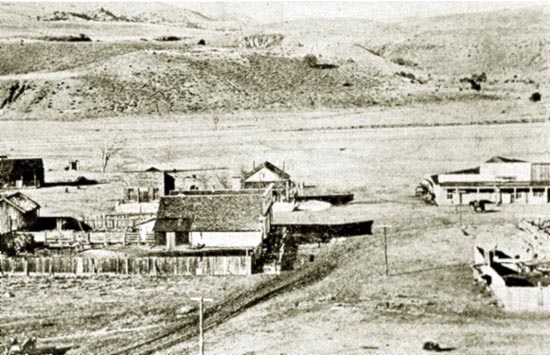
Alma, New Mexico, approx. 1900
Periodically, members of the Wild Bunch would sign on with the W S Ranch just north of
Alma, New Mexico. Reportedly,
rustling declined when the members took employment. They proved to be good cowboys.
The manager, William French, after whom the ghost town of French, New Mexico, is named,
later recalled in his 1927 Recollections of a
Western Ranchman that on a 200 mile cattle drive led by Butch to the railhead town of Magdalena, "They never dropped a hoof." The
trail passed over three mountain ranges and the 75 mile-long "Plains of San Augustin" dry lake bed. The
trail remained in use until the early 1970's when the spur line into Magdalena was abandoned. Whether they were good cowboys or not,
Alma was rough. Charles Siringo recalled that shortly before he arrived in town, there had been a shootout in the
street. A previous Pinkerton agent who wandered into town was warned by the owner of the saloon, a pleasant fellow named
Jim Lowe" that the agent needed to leave town. As Siringo, himself, was leaving the area on the Silver City stage, a fellow passenger shared a liberal supply of
liquor with Siringo. But the liquor was not all the passenger shared with Siringto. The two got drunk, sang cowboy songs, and fired shots through the cavas top of
the stage setting it on fire. Siringo learned that his fellow passenger was a friend of Lowe and that Lowe was none other
than Butch Cassidy himself. But as a result of Pinkerton attention being focused on
Alma, Cassidy packed up his bags, sold the saloon and established a new hideout somewhere in the mountains of
western New Mexico.
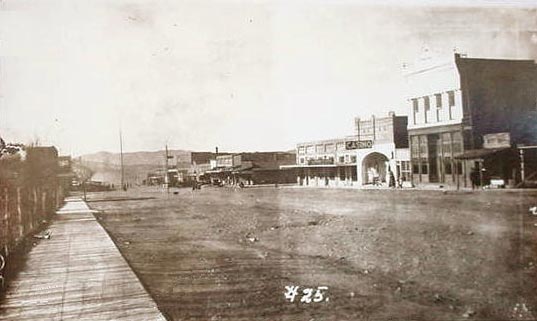
Magdalena, approx. 1910.
Cattle and sheep were regularly trailed into Magdalena from as far away as
eastern Arizona. Thus, the little adobe town prospered with ten hotels and twenty saloons. In 1901, one of those
who visiting the town hoosegow to sleep it off overnight was a WS cowboy identifying himself as
Harry Longabough.
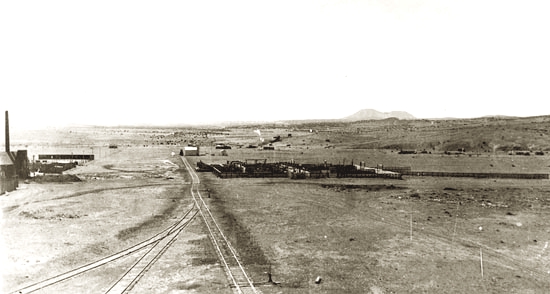
Magdalena Stockyards.
Today (2003), Magdalena has seen better days. The bank is now a small cafe. The building next door sits roofless, its walls supported from
collapsing by 2-by-6 bracing. The town marshal continues to patrol, perhaps hoping to catch errant
cowboys in pickup trucks speeding into town from the west.
Of Elzy Lay, going under the name of William H. "Mac" McGinnis," French recalled he was "a
paladin amongst cowpunchers." It is alleged that Butch and Sundance following the
Wilcox Robbery returned to the W S Ranch.
The W S was not the only ranch to discover that it had outlaws on its payroll. Tom and Sam Ketchum were
alumni of the Bell Ranch on the Canadian. As previously noted,
Sundance had been employed by the N Bar N on its Rock Creek Unit. The N Bar N,
in the same unit and at about the same time, employed "Long" Henry
Thompson, a part Cherokee. There, Thompson outdrew and killed the camp cook,
George Dunman, but Thompson was cleared on the basis of self-defense. In another shootout in Saco, Montana, Thompson killed
Ed Starr who had a reputation as a "fast gun." The jury again acquitted on the basis of self-defense not withstanding
that Starr had five bullet holes in his back. But, perhaps the jury believed that
Thompson had performed a service in ridding the world of Starr. Previously in 1892, Ed Starr
had been employed on the Hoe Ranch on Powder River in Johnson County. There Starr,
as an aftermath of the
Johnson County War, had bushwhacked the ranch foreman George Wellman. Wellman was under
instructions by the new owner of the ranch to clean out the old employees. Wellman was on his
way to meet Wyoming U. S. Marshal Joseph Rankin relating to rustling on Powder River.
Wellman was described by Colorado historian, Herbert O Brayer, in his
Range Murder: How the Red Sash Gang Dry-Gulched Deputy United States Marshal George Wellman. A
Vignette of the Johnson County War in Wyoming, Banding Iron Press, Evanston, 1955, as "a quiet,
retiring cowboy." Wellman had been appointed to replace former foreman
Frank Laberteaux who found himself in custody at Ft. D. A. Russell for his participation
in the Johnson County War. But, as they say, "there is always a faster gun."
Thus, as discussed on a subsequent page, "Long" Henry Thompson ended his career on the floor of
a Saco, Montana, saloon with four bullets in the back.
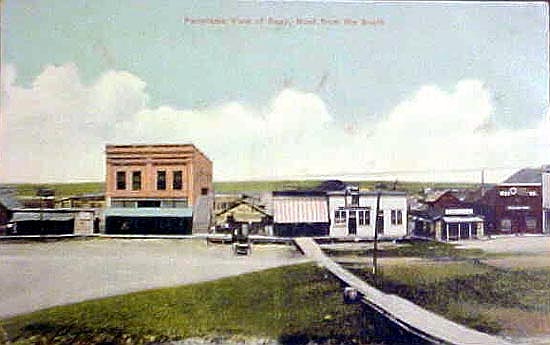
Business District, Saco, Montana, approx. 1903.
Thompson reputedly had been a member of the infamous Henry Starr gang during its formative years. Starr,
part-Cherokee and an in-law of Belle Starr, began his off-again, on-again, string of bank robberies about 1890. The robberies in
Texas, Indian Territory, Arkansas, and New Mexico continued until he was fatally wounded
in a robbery attempt in 1921. Starr was famous for twice on appeal escaping Judge Isaac Parker's noose, see
Starr v. United States, 153 U.S. 614 (1894), and Starr v. United States, 164 U.S. 627 (1897);
his gang sucessfully pulled off something the Daltons failed to do, robbing two banks at the same time in
Stroud, Oklahoma (although he, himself was captured); and the only western outlaw to make the coversion from horse back to automobile.
At the end of his career, Starr was making his getaways in high-powered touring cars. On his deathbed, be bragged to the
physician, "I've robbed more banks than any man in America." In between times, he actually managed to play himself in
a western movie.
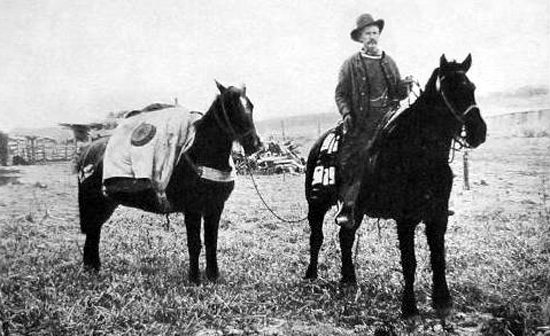
Charles Siringo
Next page: The Ketchum Brothers, Baggs.
|